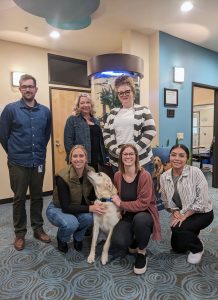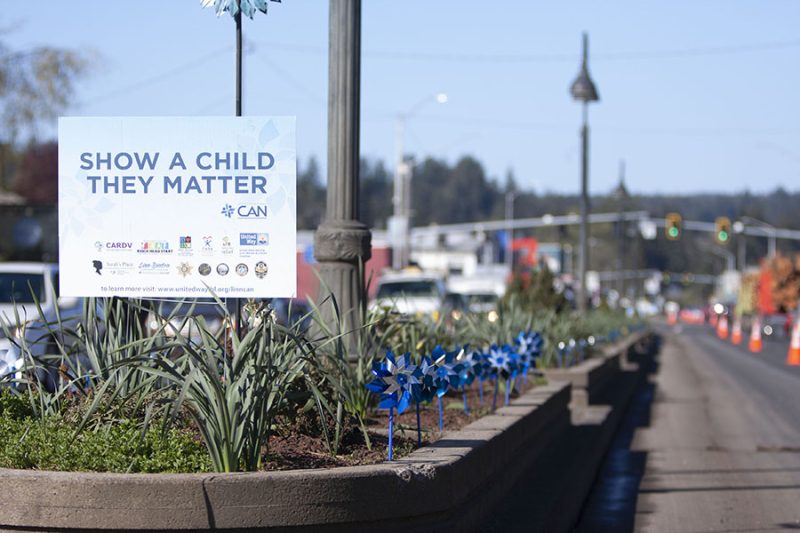They say it takes a village to raise a child, but when it comes to protecting those who need a little extra care, it takes a specific community.
Every year during Child Abuse Prevention Awareness month in April, local communities such as Sweet Home and Lebanon host an event with guest speakers who deal directly with child victims. Among the speakers regularly present are representatives from ABC House and CASA of Linn County, two nonprofit organizations who make it a goal to not only care for a victim’s needs, but also educate the public about prevention.
“Education and awareness are an incredibly important part of preventing child abuse,” ABC House Executive Director Karsen O’Bryan said.
To that effort, she reported they have been able to educate more than 5,000 students and community members on how to recognize, interrupt and report child abuse.
“We know that the more people who understand what the risk factors are and if they see something to say something, that it will help protect kids in our communities,” she said. “Our goal is to grow our prevention efforts and become the gold standard for prevention education so we can educate as many people as possible to help keep our most vulnerable kids safe.”
Currently ABC House in Albany sees about 800 kids a year, but cases had gone up in both numbers and severity surrounding the COVID-19 timeframe.
“There was a 30% increase from 2019-2022 mostly due to the factors of the pandemic – i.e. kids being at home more, not as many eyes on them, stress on families, parents out of work, etc.,” she said.
ABC House recently started doing mental health counseling in Sweet Home one day a week to help remove barriers and engage kids more.
The nonprofit operates fundraising activities year round in order to keep their services free for victims and victims’ families. According to O’Bryan, the cost of services per child starts at approximately $4,176.41, broken down as follows: medical exam, $3,227.06; forensic interview, $496; mental health assessment, $222; crisis session, $231.45.
“This is for every unique time they are seen, meaning if children come back to us multiple times, this would be the amount every time they are seen,” she said.
O’Bryan reported the most common type of child abuse case they see each year is physical abuse. She cited Karly’s Law, which passed in 2008 after 3-year-old Karly Sheehan, of Corvallis, died under the care of her mother and convicted boyfriend Shawn Wesley Field.
According to the Oregon Department of Justice, the law “mandates that children in Oregon who exhibit suspicious physical injuries in the course of a child abuse investigation must receive medical attention within 48 hours.” Karly’s father, David Sheehan, and others had reported suspected abuse of Karly several times, but she was not removed from the situation in time, according to news reports.
“Because of how robust Karly’s Law in Oregon is, we see the most physical abuse cases,” O’Bryan said.
Following closely behind cases of physical abuse are cases of sexual abuse, and then in descending order are threat of harm, neglect, and witness to violence. O’Bryan noted Linn County has a “much higher case rate” than Benton County.

When a child is taken to ABC House for help, one of the most highly admired staff members is Xander, a five year old yellow lab/golden retriever mix. Born in Australia and raised in Hawaii, he comes from an “incredibly long line” of service dogs through Assistance Dogs Northwest, O’Bryan said. His job is to greet kids and families, and “give them a friendly snuggle” when needed.
“As we know, dogs greatly reduce stress, and Xander does a wonderful job of sitting with kids while they are waiting for services, or to greet them when they come out of services,” O’Bryan said. “He will also occasionally wait with kids in the courthouse before they get on the stand to testify.”
The dog is also responsible for attending community presentations, as well as visiting schools and businesses, but he also cheers up staff when they are having hard days, she said.
“We are so extremely grateful for him to be a part of our building.”
Another angle to child support services includes the foster system and the court process many victims have to go through. CASA (Court Appointed Special Advocates), a nonprofit that trains volunteers to support foster youth, steps in by becoming involved as an advocate on behalf of a child in court.
Kids should be entitled to a safe home and surrounded by loving people, Executive Director Leslee Mayers said. CASA volunteers listen to the child’s story and bear witness to that story when needed.
“There are typically multiple agencies and people involved in a foster youth’s life and it is when all are working together that the youth most benefits,” she said.
While most of the agencies are managing multiple aspects of a family’s case and working to create stability for the child, CASA’s sole responsibility is to focus on the child, Mayers explained. They make sure the child receives all services they need, including how to be successful academically.
A CASA might stay on a child’s case for years, providing necessary history and context every time a change in a resource home or caseworker takes place. This ensures a youth does not get “lost in the system,” Mayers said.
She shared one instance when a child was moved several times and advocates began to feel he was getting lost in the system. When they tracked him down and made contact, he exclaimed, “I knew you would find me.”
Aside from being an advocate in court, CASAs find themselves helping teens learn life skills. One has taught youth how to cook and do laundry, and another connected a child to a summer camp geared specifically for kids with a certain disability.
On average, a CASA volunteer will spend between five to 10 hours a month working on a case. Each open case lasts about two years. The workload includes: meeting with the youth; reviewing reports and documents from Oregon Department of Human Services and services providers; talking with teachers, family members of youth and resource parents; attending meetings facilitated through ODHS; attending court; and writing reports.
Mayers reported they are currently serving around 104 youth, which makes up around 50% of the youth care in Linn County. CASA volunteer service tends to last around four years, she said. CASA of Linn County provides information sessions on the second Thursday of each month and training three times a year (February, April and September/October). Anyone interested in becoming a CASA will go through an application and background process, as well as complete 35 hours of pre-service training and court observation.
“Did you know that one meaningful and nurturing relationship with an adult is a child abuse prevention strategy?” Mayers asked. “While we focus-in on foster youth, it’s our community’s responsibility to focus-in on all youth.”





